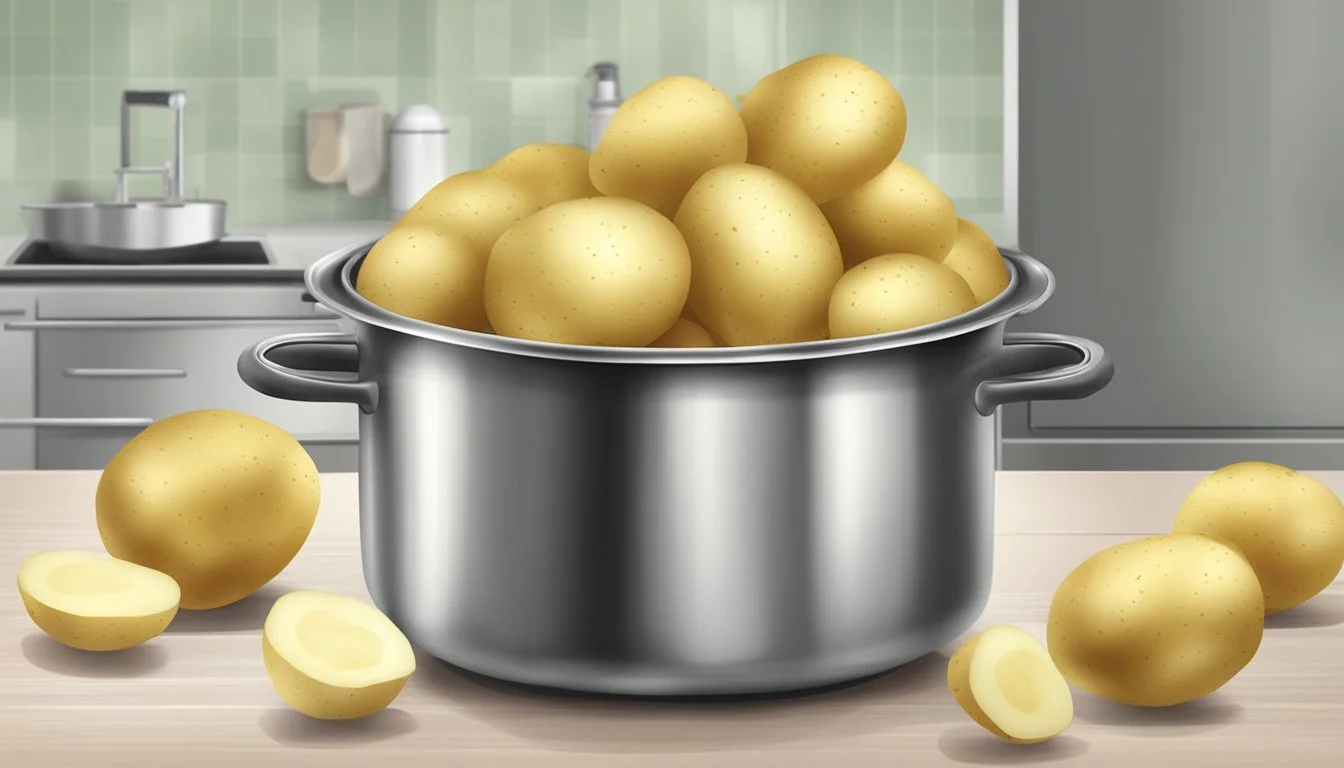Gut-Soothing Foods That Help Relieve Diarrhea Fast
Experiencing diarrhea can be extremely uncomfortable and disruptive to daily life. Identifying the right foods to consume during this time is crucial to alleviate symptoms and promote quicker recovery. Eating specific types of food can help manage and reduce the effects of diarrhea.
Nutrition plays an essential role in managing digestive health. By choosing appropriate foods, individuals can support their body’s recovery process and ensure they remain hydrated and nourished during bouts of diarrhea. Understanding which foods to incorporate and which to avoid can make a significant difference in comfort and health.
1) Bananas
Bananas are a beneficial food to consume when experiencing diarrhea. They are easy to digest and contain pectin, a type of soluble fiber that helps absorb excess water in the intestines.
The high potassium content in bananas is crucial for replenishing electrolytes lost through diarrhea. This helps prevent dehydration and maintains proper cell function.
Eating ripe bananas can provide a soothing effect on the stomach. They are gentle on the digestive system and help bind loose stools, making them an ideal choice during episodes of diarrhea.
Unripe bananas have resistant starch, which can further assist in firming up stools. Incorporating bananas into a diet when dealing with diarrhea can contribute significantly to symptom relief and recovery.
2) White Rice
White rice is a staple food that can significantly aid in managing diarrhea.
It is low in fiber, making it easy to digest. This can help avoid further irritation of the digestive tract. The simplicity of white rice helps ensure that it binds stools, reducing the frequency and urgency of bowel movements.
White rice is also bland, which makes it less likely to worsen symptoms. Its starchy content helps absorb excess fluid in the intestines. This aids in firming up loose stools.
Cooking white rice in plain water is recommended. It should be served without added spices or fats that can irritate the gut further. Utilizing rice water as a hydration method can be beneficial as well. The starch in the water helps bind stools, providing additional relief.
Incorporating white rice into the BRAT diet (Bananas, Rice, Applesauce, Toast) is often advised for those with diarrhea. This group of foods works together to help soothe the digestive system and minimize discomfort.
3) Applesauce
Applesauce is often recommended when dealing with diarrhea. Its smooth texture makes it easy to digest, minimizing strain on the digestive system.
Unlike raw apples, applesauce is broken down, which helps prevent further irritation. The pectin in applesauce, a type of soluble fiber, can assist in firming stools.
This food is also devoid of any spices or harsh additives. This makes it a suitable choice for sensitive stomachs.
4) Toast
Toast is a staple of the BRAT diet, which stands for bananas, rice, applesauce, and toast. This diet is often recommended to help manage diarrhea.
Toast is easy to digest and provides a bland option that is unlikely to irritate the stomach.
Dry white toast is preferred as whole grain options can be harder to digest.
The simplicity of toast makes it a suitable choice when dealing with digestive issues. It helps bind stools due to its low fiber content, which is beneficial during bouts of diarrhea.
Consuming toast can help provide necessary calories without overwhelming the digestive system.
It can be eaten plain or with a small amount of jam, but it is advisable to avoid high-fat spreads or butter, which might aggravate symptoms.
Maintaining hydration is also crucial, so pairing toast with clear fluids can be helpful.
Toast serves as a foundational food that supports recovery and offers a sense of comfort.
5) Plain Crackers
Plain crackers are often considered a safe and easy-to-digest food for those experiencing diarrhea. They are bland, low in fiber, and unlikely to irritate the digestive system.
Plain crackers provide some calories and carbohydrates without being too heavy on the stomach. Their simple composition can help in gradually reintroducing solid food into the diet.
It's best to choose plain varieties without added flavors or seasonings. This helps avoid ingredients that might trigger further digestive discomfort or irritation.
Saltine crackers are a popular choice due to their simplicity and mild flavor. They can also help maintain sodium levels, which may be beneficial when dealing with dehydration.
Crackers made from refined white flour are preferable over whole grain options in this context. Whole grains can introduce more fiber, which might exacerbate diarrhea symptoms.
6) Boiled Potatoes
Boiled potatoes can be a helpful food choice when managing diarrhea. They are easy to digest and provide essential nutrients without irritating the digestive system. Removing the skin before boiling ensures that the potatoes are less fibrous, making them gentler on the stomach.
Potatoes are rich in potassium, an important electrolyte that can be depleted during episodes of diarrhea. Including boiled potatoes in the diet can help replenish these vital nutrients. They also contain carbohydrates, providing energy without causing further gastrointestinal distress.
Boiling potatoes can make them soft and easier to consume. They do not contain spices or other additives that might upset the stomach further. This makes them a simple yet effective option for those dealing with digestive issues.
7) Skinless Chicken
Skinless chicken is a beneficial food choice when dealing with diarrhea. It provides a good source of lean protein, which is essential for maintaining strength and repairing body tissues.
The absence of skin reduces the fat content, making it easier on the stomach. High-fat foods can exacerbate diarrhea symptoms, so opting for low-fat meats is advisable.
Consuming skinless chicken helps ensure the body gets necessary nutrients without risking further irritation. Cooking methods like boiling or grilling are recommended to keep it bland and easier to digest.
By including skinless chicken in the diet, individuals can support their recovery while avoiding additional digestive strain.
8) Plain Yogurt
Plain yogurt can be a useful food option when experiencing diarrhea. It contains probiotics, which are beneficial bacteria that help maintain gut health.
The probiotics in yogurt may aid in restoring the natural balance of the intestine. This can potentially reduce the duration and severity of diarrhea symptoms.
It’s important to choose plain, unsweetened yogurt. Flavored yogurts often contain added sugars that can worsen diarrhea symptoms.
Additionally, plain yogurt is easy to digest and provides a source of protein and calcium. This makes it a gentle food option for a sensitive stomach.
People should look for yogurt that contains live and active cultures. These live cultures are key to replenishing the gut flora that might be disrupted during a bout of diarrhea.
9) Oatmeal
Oatmeal is often recommended for those dealing with diarrhea. It is a bland food that can be easily tolerated when digestion is compromised.
The soluble fiber in oatmeal helps absorb excess water in the bowel, which can firm up stools and reduce the frequency of diarrhea.
Unlike high-fiber foods like whole grains and nuts, oatmeal is digestible and gentle on the stomach, making it an excellent choice.
Incorporating oatmeal into the diet can offer a soothing effect on the gastrointestinal system, which is essential during bouts of diarrhea.
Oatmeal can be prepared simply with water or milk, avoiding any added sugars or heavy toppings that could further irritate the digestive tract.
Eating oatmeal in small amounts at first is advisable. This allows the digestive system to adjust before integrating other solid foods.
10) Herbal Tea (e.g., chamomile)
Herbal teas can offer relief for diarrhea. Chamomile tea, in particular, is known for its soothing properties.
Chamomile tea is an herbal infusion made from chamomile blossoms. It has calming effects that can help settle an upset stomach. The tea's antibacterial and antiviral properties may help eliminate harmful pathogens.
Peppermint tea is another helpful option. It has a refreshing taste and can be consumed hot or cool, depending on preference.
Green tea also offers benefits. Its antimicrobial properties can target infections that may cause diarrhea. Adding cinnamon can enhance its effectiveness in soothing stomach discomfort.
Understanding Diarrhea
This section provides insights into the common causes of diarrhea and examines the symptoms and severity that individuals might experience.
Causes of Diarrhea
Diarrhea can be triggered by various factors, each affecting the digestive system differently. Infections from viruses, bacteria, or parasites are common causes. Contaminated food or water often introduces these pathogens into the body.
Food intolerances and sensitivities, such as lactose intolerance or reactions to gluten, can lead to diarrhea. Medications such as antibiotics sometimes disrupt the natural balance of intestinal flora, resulting in digestive issues. Chronic conditions like irritable bowel syndrome (IBS) and inflammatory bowel disease (IBD) often cause persistent diarrhea. Lastly, stress and anxiety are known to affect gut function, potentially leading to diarrhea episodes.
Symptoms and Severity
Symptoms of diarrhea vary but typically include frequent, loose, watery stools. Individuals might also experience abdominal cramps, bloating, and an urgent need to use the bathroom. Nausea and vomiting can accompany these symptoms, especially if an infection is the cause.
The severity of diarrhea can range from mild to severe. Mild cases might last a few days and resolve without intervention. Severe cases involve dehydration, where the body loses essential fluids and electrolytes, necessitating medical attention. Signs of severe dehydration include dry mouth, extreme thirst, reduced urine output, and dizziness. In such situations, prompt medical care is crucial to prevent complications.
Dietary Adjustments
Certain foods can worsen the symptoms of diarrhea, while others can help. Understanding which foods to avoid and which to eat is crucial. Hydration is also a key component in managing diarrhea effectively.
Foods to Avoid
Avoid foods that might aggravate diarrhea. This includes spicy foods, which can irritate the digestive system, and fatty foods, which can be hard to digest. Dairy products should be avoided as well, especially if lactose intolerance is suspected, as they can lead to increased bloating and gas.
High-fiber foods such as whole grains, nuts, and seeds can further irritate the intestines. Sugary foods and artificial sweeteners like sorbitol can exacerbate symptoms. Caffeinated and alcoholic beverages are also best avoided as they can lead to dehydration and worsen diarrhea.
Recommended Foods
The BRAT diet (Bananas, Rice, Applesauce, Toast) is often recommended. These foods are bland and can help in firming stool. Bananas provide potassium, an essential electrolyte.
Rice and other starchy foods like plain pasta and potatoes help in absorbing water and firming stool. Applesauce offers pectin, which can aid gastrointestinal health. Toast is easy on the stomach and provides necessary carbohydrates. Including oats can be beneficial due to their soluble fiber, which can help in forming stools.
Hydration Tips
Hydration is crucial. Water should be consumed consistently throughout the day. In addition, consuming oral rehydration solutions (ORS) can help restore lost electrolytes more effectively. Clear broths and herbal teas also help provide fluids and might be more palatable for some.
Avoid sugary and caffeinated drinks, as they can lead to dehydration. Adding a pinch of salt and sugar to water can create a simple, homemade rehydration solution. Sports drinks can be an alternative but should be consumed in moderation due to their high sugar content.
When to Seek Professional Help
Diarrhea is often a temporary condition that can be managed with home remedies. There are times, however, when it's critical to seek professional medical attention.
Persistent Symptoms
If diarrhea lasts more than two days without improvement, it is essential to consult a healthcare provider. Persistent symptoms may indicate a more serious condition.
Severe Symptoms
Seek immediate medical help if you experience any of the following:
High Fever: A temperature above 100.4°F (38°C)
Severe Abdominal Pain: Intense discomfort or cramping
Blood or Pus in Stool: Signs of infection or other issues
Black or Tarry Stool: Possible internal bleeding
Dehydration Signs
Dehydration can be a serious consequence of diarrhea. Look out for these key signs:
Dry Mouth or Skin
Extreme Thirst
Little or No Urination
Dizziness or Lightheadedness
Pre-existing Conditions
Individuals with certain conditions should be more cautious. Those with:
Diabetes
Kidney Disease
Heart Issues
should contact a healthcare provider sooner than others, as diarrhea can aggravate existing problems.
Travel History
Recent travel, especially to developing countries, can expose individuals to different pathogens. If diarrhea occurs after traveling abroad, professional evaluation is recommended to rule out infections like parasites.
Children and Elderly
Infants, young children, and elderly are more susceptible to complications. It is especially important for these groups to receive prompt medical attention.
When unsure, it's always better to err on the side of caution and seek professional advice. Proper diagnosis and treatment ensure a safe recovery.









